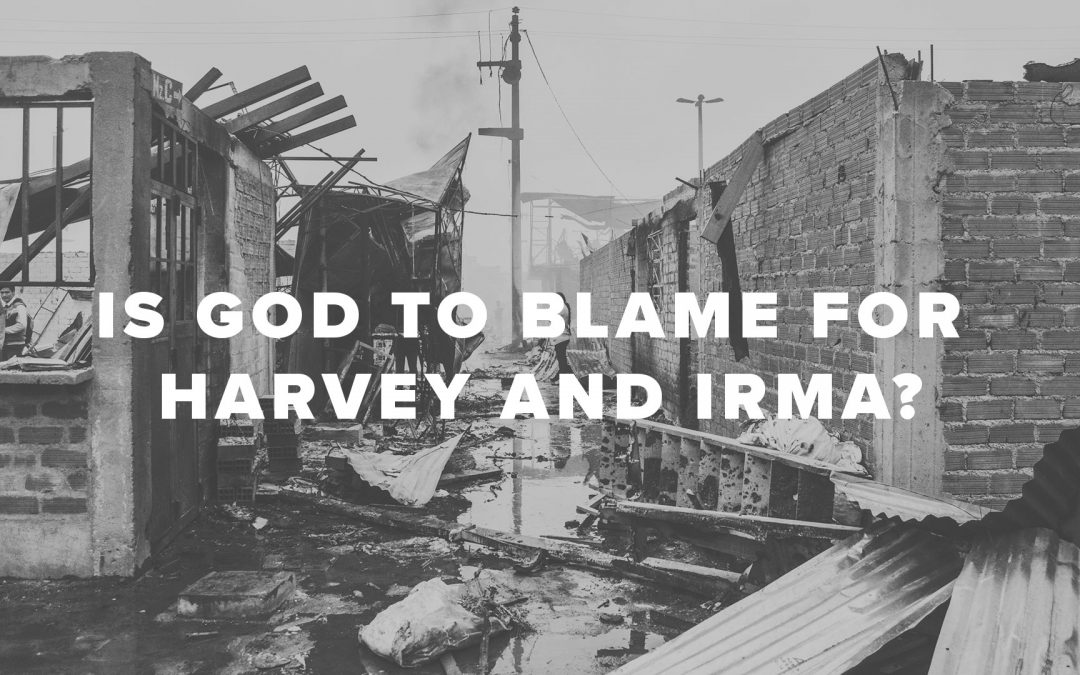I saw a post this morning on Facebook that had pictures of wildfires on the west coast, flooding and hurricanes on the east coast, tornadoes in the Midwest, and so on… At the end of this post was a quote from a certain book at the end of the Bible that supposedly refers to natural disasters being used by God to judge the earth and all its wrongdoings. At least, that’s what the post was intended to communicate. So in light of recent events such as Hurricane Harvey (and more hurricanes coming) and the wildfires in California and the Pacific Northwest, where is God in all this we might ask? Is he causing this to make us repent? Is he mysteriously absent and letting the world crumble to bits? I don’t think either of those explanations are particularly helpful not to mention are they an accurate description of the character of God. Let’s unpack God and natural disasters a bit here and how we can helpfully describe God’s role and our role in the midst of them.
1.Not everything happens for a reason, and if something does have a reason, that doesn’t mean it has to be God.
As humans, we want justification when something goes wrong. This is only common and is not a terrible thing in-and-of-itself. However, it becomes dangerous when we start blaming God or attributing everything that happens in the world, including patterns of weather, on God’s mighty hand and justify it with bad readings of Scripture. It becomes really dangerous when we start describing these supposed acts of God as an act of grace in order to get us to repent of our sinful behavior as a society. Weather happens. Droughts happen and fires start. We build cities in flood plains or in the paths of tornadoes. None of this has to automatically be chalked up to divine judgment nor should it be. God loves the entire world, human beings are a part of that no matter how bad we tend to make things worse.
2.God doesn’t cause suffering, God suffers with us. God’s plan is to end suffering, not cause more.
Not only can it be unhelpful to attempt to encourage someone who has just suffered loss in the midst of a natural disaster that everything happens for a reason, it can be equally unhelpful to assure him or her that God was behind that reason as we just saw in point number one. But why is this unhelpful? Well, because it is not Christ-like. When God revealed his character in the person and work of Jesus, he did so by suffering for us and as one of us. He did so by suffering what we suffered and experiencing what we experience. God did not send Jesus into the world in order to cause more suffering nor does God send storms to do his dirty work. Throughout Scripture, and especially in the life of Jesus, we see God responding to suffering in a redemptive way, not causing more in a violent way.
3.God has a plan, and that plan includes us.
Yes, God does have a plan through all this suffering and disaster, and that plan includes us. Natural disasters are not opportunities to find ways to explain them away or blame a particular sin for their occurrence; they are opportunities to find clarity about what really matters when they strike. What matters you might ask? People matter. These situations tell us as much about who we are as they do about who God is. It frees us from the lies we tell ourselves about being in control. It frees us from the routines that we mistake for our identities like our careers, teams, etc.. It has the potential to free us from the disputes we have over race, class, politics, and yes, even religion. Furthermore, these situations remind us that we can change when we all come together. From chaos, God brings order through love and God has been doing this since the beginning of creation. So while we’re in the middle of the earth groaning, let’s remember that disaster doesn’t have the last word. Storms will pass. Cities will be rebuilt. And love cannot be destroyed, so let’s respond with it when it really counts.


Amen! It’s easy to avoid accountability, run to justifications and blaming. It can be hard to run to love with the worlds lies, but with Gods truths, running into “Loves” arms is comforting and often the ONLY solution. Praise Jesus for such enlightenment and shining through you Rusty. God bless. Thank you.
God surely controls every aspect of the weather at every second, and often uses it for various reasons….here are 20 examples from Scripture…..http://christiananswers.net/q-eden/edn-c023.html
But if you look at Scripture, God allows disasters to happen to cause us to repent. Look at the Ten Plagues of Egypt, or really any time God says that because we sinned, there will be consequences. God bless
“For the wages of sin is death, but the gift of God is eternal life in Christ Jesus our Lord.” Romans 6:23